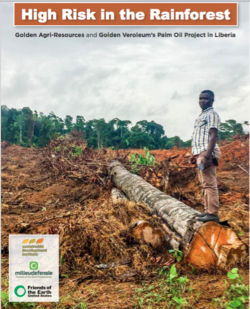Front Page Africa | 3 July 2018
Liberia: Another SDI report finds GVL in Sinoe land grab, deforestation
Liberia: Another SDI report finds GVL in Sinoe land grab, deforestation
Monrovia – A new report by Sustainable Development Institute (SDI) into the operations of Golden Veroleum Liberia (GVL) in Sinoe County has again found that the company is involved in land grabbing, deforestation and environmental degradation. SDI has released series of reports on GVL in recent years.
Launched on Monday in Monrovia, the report found that GVL violated the rights of communities to the customary ownership of their lands, violated the Liberian laws and international standards, and even breached its own policies.
Entitled “High Risk in the Rainforest”, the report, the SDI says, is the result of a field assessment done between September 2017 and April this year in collaboration with an international nongovernmental organization, Friends of the Earth. It was released simultaneously in the United States and the Netherlands.
GVL did not respond to questions for comments up to press time.
In February the Roundtable on Sustainable Oil Palm (RSPO) booked GVL in its Complaint Panel report but this SDI report found that the company acquired lands for its plantation throughout Sinoe without getting communities’ free, prior and informed consent. In some cases, the report said GVL was still constructing in disputed areas it was ordered to stop work by the RSPO. “GVL continues operations, including land clearance and mill construction, in the disputed area,” it said.
“GVL land acquisition processes violate Liberia’s Community Rights Law and Land Rights Policy, as they disregard communities’ land and natural resource rights,” it added. “GVL’s 65-year concession agreement contravenes Liberia’s Public Lands Law, which states that no such lease shall exceed 50 years.”
On environmental degradation, the report found that GVL “continues to damage streams, wetlands and riparian buffer zones and has failed to provide compensation for previous damage to community water sources.” It added that since 2015 GVL has cleared or fragmented at least 380 hectares of high carbon stock (HCS) forest, 268 of which were conservation areas. And since March 2017, it found, GVL has cleared or fragmented about 320 hectares of high conservation value (HCV) areas that include chimpanzee habitats that the company itself had identified.
The report also found GVL has not established any of the 40,000 hectares of out-grower plantations mandated by its concession agreement with the government of Liberia.
GVL in 2010 signed the 65-year concession for 350,000 hectares of land or approximately 2.3 percent of Liberia’s total landmass. The company’s primary investor is Golden Agri-Resources (GAR), one of the world’s largest palm oil companies, listed on the Singapore Exchange (SGX). Despite it is not clear whether GAR can be held liable for GVL’s activities in Liberia, the report found GVL breached GAR’s Forest Conservation Policy and linked its financiers.
The said violation of communities’ rights could drive away investors, according to the report, and stall progress in a country yet to fully recover from 14 years of civil war and the ravages of a deadly Ebola outbreak. “Deforestation, environmental degradation and associated human rights issues, including social conflict stemming from violations of communities’ land rights, can significantly undermine economic development and stability…,” the report said.
Banks and investors should consider the palm oil industry to be a high-risk sector and should put in place appropriate due diligence and risk management procedure,” the report recommended. It further recommended that GVL halts operations in disputed areas—as the RSPO mandated—and, among others, renegotiate and finalized provisional memoranda of understanding with communities.
The report also called on the Liberian government to pass into law the 2014 version of the Land Rights Act that fully recognizes customary land ownership and communities’ participation as well as a stronger law for the oil palm sector. “‘High Risk in the Rainforest’ is calling for better scrutiny and oversight and more importantly the use of this report as an opportunity to start a national conversation about reforming the Oil palm sector,” SDI Coordinator Nora Bowier was quoted in the statement.
“The absence of a national agriculture law and policy for large-scale land acquisition allows for oil palm companies to operate in ways that infringe on the rights of customary communities and forest-dependent people. This lack of regulatory framework also puts at risk natural habitat including endangered species that are native to Liberian Forest.”
The Chairman of the Senate’s Committee of Land, Mines, Energy, Natural Resources and Environment Senator George Tingbeh assured the ceremony marking the launch of the report that most of the problems found by the report would be averted if the Land Right Act passes. “If I had not attended the launching of this report, I would have missed something,” Senator Tingbeh said. “The people have to benefit,” he said, expressing optimism of the passage off the Act before the end of September.
The focal person on oil palm concession at the Ministry of Agriculture, Francis Mwah conceded that communities were not consulted before oil palm concessions were signed. He said the government was not “recognizing” that by preparing to make Liberia RSPO-certified.
Report by James Harding-Giahyue, FPA Contribution














